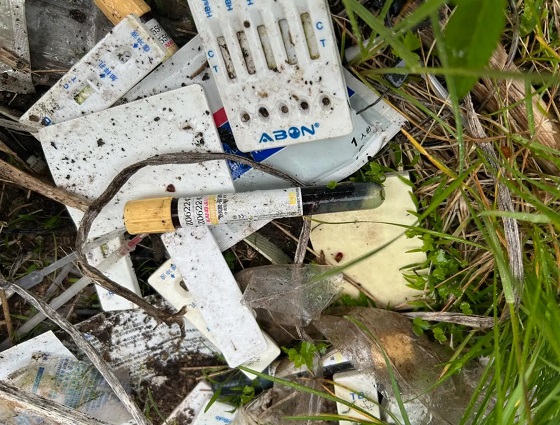Business
INDIGENOUS CONSULTATION AND ENGAGEMENT AT CANADA’S ENERGY AND UTILITY REGULATORS

INDIGENOUS CONSULTATION AND ENGAGEMENT AT CANADA’S ENERGY AND UTILITY REGULATORS
CAMPUT is the Association of Canada’s provincial, territorial and federal energy and utility regulators. CAMPUT’s purpose is to improve energy and utility regulations in Canada and to educate and train our members. We are highlighting the work of two of our members, the Canadian Nuclear Safety Commission and the Canada Energy Regulator, in the areas of Indigenous consultation and engagement.
The Canadian Nuclear Safety Commission (CNSC) has a broad mandate, including to protect health, safety and security, and the environment, and to disseminate objective scientific, technical and regulatory information to the public, including Indigenous groups. The CNSC is also an agent of the Crown with the responsibility of ensuring the Duty to Consult is met before making decisions. The CNSC has explored various means to ensure that Indigenous groups’ voices are heard and integrated into Commission decision-making. The CNSC has also committed to developing on-going, respectful relationships that allow open dialogue in the spirit of reconciliation and trust building.
First, the CNSC focused in-house and put into place policies, practices and processes with an overarching regulatory framework and management system to confirm that CNSC decisions uphold the Honor of the Crown. This included a Regulatory Document (REGDOC 3.2.2, 2016) that sets out the Commission expectations on how proponents play a significant role in working with Indigenous groups to address concerns and mitigate impacts and / or treaty rights, early in design and project proposal stages.
The CNSC also has a dedicated team with expertise in Indigenous consultation and engagement that conducts ongoing engagement with Indigenous groups with interests in nuclear facilities. The long-term goal is to help build relationships and trust and help CNSC staff learn more about the history, rights, interests, and culture of the Indigenous groups. The CNSC continues to work with Indigenous groups to ensure they are provided the opportunity to present their views and give oral presentations at Commission hearings.
To support this participation, the CNSC has put in place a Participant Funding Program that in part, has helped Indigenous groups hire consultants to review technical scientific reports, fund Indigenous Knowledge studies, cover community meeting costs, pay Honoraria for elders, and costs for travel and preparations for hearings. Further, Commission hearings have taken place in communities near facilities to allow easier access by Indigenous groups, and teleconferencing, web access, live streaming and simultaneous translation in Indigenous languages has also been used.
The CNSC acknowledges the importance of working with and integrating Indigenous Knowledge alongside scientific and regulatory information in its assessments and regulatory processes, where appropriate and where authorized by Indigenous communities. Indigenous ways of knowing and cultural context enhance the CNSC’s understanding of potential impacts of projects and strengthens project reviews and regulatory oversight.
The CNSC also runs its own Independent Environmental Monitoring Program (IEMP) that seeks Indigenous participation in taking samples from public areas around nuclear facilities and measuring and analyzing the amount of radiological and hazardous substances in the samples. Following discussions with many Indigenous groups, it was recognized that they could play a key role in identifying country foods and traditional harvest areas and participate as part of the IEMP. Getting meaningful monitoring results to Indigenous communities is a key priority for the CNSC.
The Canada Energy Regulator (CER) welcomes change. In August 2019 we transitioned from the National Energy Board to the Canada Energy Regulator. The CER has been given new legislation and is focused on improvement. Reconciliation with Indigenous Peoples is a pillar of our renewal.
Our legislation directs us to find meaningful ways to engage with Indigenous Peoples. We embrace our new mandate and have woven specific deliverables on reconciliation into every aspect of our work.
Our vision: to transform the way we work with Indigenous Peoples, recognizing their unique cultures, knowledge and histories; and endeavor to reflect a renewed Nation- to-Nation relationship based on the recognition of rights, respect, cooperation and partnership.
We recognize reconciliation is an ongoing process that occurs in the context of evolving Indigenous-Crown relationships. Sitting around the table with Indigenous communities, we are working to find new ways to co-manage regulatory oversight. We recognize the inseparable connection Indigenous Peoples have with the land and the water, and we will work collaboratively to protect them. We are also ensuring we equip the communities with the right skills and support to make the changes we envision a reality.
Indigenous Advisory and Monitoring Committees (IAMC) bring together Indigenous and federal leaders to provide advice to regulators and to monitor the Trans Mountain Expansion and Line pipelines. Members share the goals of safety and protection of environmental and Indigenous interests in the lands and water. Indigenous participation does not equal support or opposition for a project, allowing for better information-sharing within the group. This initiative represents a foundational change in the way the CER and the Federal government work with Indigenous Peoples. It aims to develop an enduring and meaningful relationship for the entire lifecycle of the project. We believe our work with the IAMCs can lead the way on co- management of regulatory oversight activities and has the potential to be applied across the rest of Canada’s energy system.
Here are some other ways we are changing how we work with Indigenous Peoples:
- We are meeting with Indigenous communities earlier on who may be impacted by projects we regulate to better understand their concerns and share how the CER holds companies accountable for the protection of Indigenous rights and interests.
- We are adapting our hearing processes to allow for different paths of Indigenous participation. This includes sharing Indigenous Knowledge, allowing for ceremonies, selecting specific locations for the hearing that are convenient to Indigenous participants or elders, and allowing for remote participation if travel is not possible.
- We are developing a National Indigenous Monitoring Policy so that all CER-regulated infrastructure projects can benefit from Indigenous Knowledge when they are being build and operated.
- We are training our employees to understand more about Indigenous history, culture and contemporary issues facing Indigenous Peoples in Canada. This training ensures that consideration of Indigenous rights and interests and becomes embedded in our way of working.
Background. The Canadian Energy Compendium is an annual Energy Council of Canada initiative which provides opportunity for cross-sectoral collaboration on a topic of shared interest across the Canadian energy sector, produced with the support of Canada’s national energy associations and Energy Council of Canada’s members. The stories contributed to the 2019 edition, Indigenous Energy Across Canada, highlight current conversations celebrating Canada’s dynamic energy sector and encouraging its continuous improvement.

Thanks to Todayville for helping us bring our members’ stories of collaboration and innovation to the public.
Click to read a foreward from JP Gladu, Chief Development and Relations Officer, Steel River Group; Former President and CEO, Canadian Council for Aboriginal Business.

JP Gladu, Chief Development and Relations Officer, Steel
River Group; Former President & CEO, Canadian Council for Aboriginal Business

Jacob Irving, President of Energy Council of Canada
The Canadian Energy Compendium is an annual initiative by the Energy Council of Canada to provide an opportunity for cross-sectoral collaboration and discussion on current topics in Canada’s energy sector. The 2020 Canadian Energy Compendium: Innovations in Energy Efficiency is due to be released November 2020.
Click to read comments about this series from Jacob Irving, President of the Energy Council of Canada.
Hydro-Québec takes partnerships, environmental measures and sharing of wealth to new levels
Business
Coffee price explosion a self-inflicted wound: Liberal tariff drives up cost of coffee

This article supplied by Troy Media.
Since March 3, Canadian importers have been paying an additional 25 per cent tariff on imported coffee. This counter-tariff, introduced as part of Ottawa’s retaliatory response to a trade dispute triggered by new United States duties on Canadian agricultural exports earlier this year, directly affects a product that isn’t even grown in Canada.
Coffee is up 19 per cent—and global markets aren’t to blame. Ottawa’s political posturing is burning your wallet, one cup at a time
Canadians are paying 19 per cent more for ground coffee this year—and it’s not because of global supply issues. It’s because of a self-inflicted policy
mistake: a 25 per cent tariff imposed by Ottawa on imported coffee, a product Canada doesn’t even grow.
Many consumers may attribute the spike to global market volatility, especially after coffee futures soared to a record high of more than US$4.40 per
pound in February. But that explanation no longer holds—futures have since dropped by more than 30 per cent, yet retail prices remain stubbornly high. So, what’s driving this divergence?
The answer lies, in part, in trade policy.
Since March 3, Canadian importers have been paying an additional 25 per cent tariff on imported coffee.
This counter-tariff, introduced as part of Ottawa’s retaliatory response to a trade dispute triggered by new United States duties on Canadian agricultural exports earlier this year, directly affects a product that isn’t even grown in Canada.
Unlike dairy or poultry, coffee has no domestic farming sector to protect. These tariffs aren’t shielding Canadian producers—they’re punishing
Canadian consumers and businesses.
To grasp the scale of this impact, consider the size of the industry. According to Introspective Market Research, retail coffee sales in Canada total more than $2.7 billion annually and are projected to grow steadily over the next decade. Meanwhile, coffee shops and quick-service restaurants, from Tim Hortons to independent cafés, generate an additional $6.4 billion per year. Tim Hortons alone sells more than five million cups of coffee per day.
This is not a fringe sector; it’s a critical part of both our economy and our culture.
Ironically, the U.S.—our supposed trade adversary in this case—doesn’t grow coffee either. Yet both countries are now entangled in a tariff tug-of-war that serves no practical purpose. The same logic applies to tea, which is also subject to retaliatory measures.
The tariffs were introduced under the Trudeau government in a broader geopolitical strategy that often felt more performative than pragmatic. Trudeau’s combative approach to trade, seemingly crafted on a whiteboard without regard for economic fallout, may have resonated politically, but it ignored basic economic principles. Consumers were never part of the equation.
In contrast, Prime Minister Mark Carney appears to be taking a more measured approach. Tariffs on U.S. alcohol and citrus products remain, but those can be sourced from other markets with relatively little disruption. Coffee and tea, however, are a different matter. There are no alternative domestic sources. The cost of these tariffs is being passed directly to roasters, grocers, restaurants, and ultimately, to the consumer.
Compounding the problem is the volatility of American trade policy under U.S. President Donald Trump, which continues to inject uncertainty into food markets. Tariffs come and go with the political winds, forcing companies to engage in “buffer pricing.” Much like travelers buying insurance for
unpredictable weather, companies build in extra costs to guard against political surprises. It’s effectively a tax on unpredictability, and it’s now embedded in the price Canadians pay at the till.
And while consumers might not feel the same pinch at their local café, where coffee is a smaller fraction of the total cost of a cup, the grocery aisle tells a different story. That’s where the full weight of these policies lands.
Whether a new trade agreement can be reached by the self-imposed July 21 deadline—or a damaging 35 per cent tariff Trump has set for August 1 can be avoided—remains uncertain. But what should be obvious is this: both Canada and the U.S. need to keep essential agri-food imports like coffee and tea out of their geopolitical fights.
Canada has a vibrant coffee ecosystem, built on roasting, innovation and consumer culture, not cultivation. There is no economic rationale for taxing it. Canadians shouldn’t be paying more for their morning brew just to send a symbolic message to Washington.
It’s time Ottawa led by example and scrapped these pointless tariffs.
Dr. Sylvain Charlebois is a Canadian professor and researcher in food distribution and policy. He is senior director of the Agri-Food Analytics Lab at Dalhousie University and co-host of The Food Professor Podcast. He is frequently cited in the media for his insights on food prices, agricultural trends, and the global food supply chain.
Troy Media empowers Canadian community news outlets by providing independent, insightful analysis and commentary. Our mission is to support local media in helping Canadians stay informed and engaged by delivering reliable content that strengthens community connections and deepens understanding across the country.
Automotive
Another sign Canada’s EV mandate is FAILING

By Dan McTeague
While other countries are moving away from EVs, the Carney government is doubling down.
Last week, it was reported that the feds are considering reimbursing car dealerships impacted by the sudden suspension of EV rebates. It’s becoming clear that Canada’s EV ambitions are failing as EV sales are plummeting and car manufacturers are backtracking on their EV plans.
It’s not too late for the Carney government to backdown from its EV mandate.
Dan McTeague explains.
-

 Energy2 days ago
Energy2 days agoIs The Carney Government Making Canadian Energy More “Investible”?
-

 Business2 days ago
Business2 days agoCompetition Bureau is right—Canada should open up competition in the air
-

 Immigration2 days ago
Immigration2 days agoUnregulated medical procedures? Price Edward Islanders Want Answers After Finding Biomedical Waste From PRC-Linked Monasteries
-

 Business2 days ago
Business2 days agoDemocracy Watchdog Says PM Carney’s “Ethics Screen” Actually “Hides His Participation” In Conflicted Investments
-

 Business2 days ago
Business2 days agoIt’s Time To End Canada’s Protectionist Supply Management Regime
-

 COVID-192 days ago
COVID-192 days agoFreedom Convoy leaders’ sentencing hearing to begin July 23 with verdict due in August
-

 National2 days ago
National2 days agoLiberals push to lower voting age to 16 in federal elections
-

 Bruce Dowbiggin22 hours ago
Bruce Dowbiggin22 hours agoHow Did PEI Become A Forward Branch Plant For Xi’s China?









